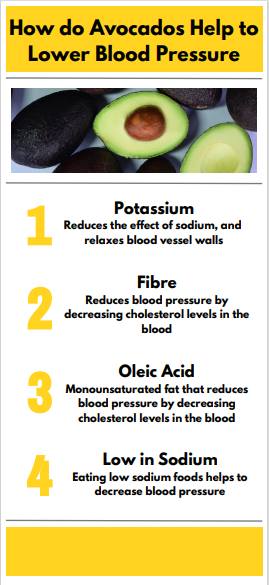Is avocado good for blood pressure? Or are you worried that avocados are full of fat and should be avoided?
If so, keep reading!
This article defines the importance of maintaining healthy blood pressure, the benefits of avocados for blood pressure, as well as tips to incorporate more avocados into your diet.
Top Takeaways
- Blood Pressure Basics:
- Blood pressure is the force exerted by blood against artery walls, essential for delivering oxygen and nutrients throughout the body.
- Optimal blood pressure is typically 120mm Hg (systolic) over 80mm Hg (diastolic).
- Importance of Healthy Blood Pressure:
- Maintaining healthy blood pressure is crucial to reduce the risk of heart disease, heart attacks, and strokes.
- A diet rich in fruits, vegetables, potassium, fiber, and low in sodium and saturated fat helps manage blood pressure.
- Avocado’s Positive Impact on Blood Pressure:
- Regular avocado consumption is linked to a lower risk of heart-related diseases.
- Avocados are a source of potassium, magnesium, fiber, and monounsaturated fats, all contributing to blood pressure control and overall heart health.
- Additional Health Benefits of Avocado:
- Avocado consumption can enhance heart health by reducing cholesterol levels and mitigating inflammation.
- Avocado’s insoluble fiber aids digestion and promotes gut health.
- Despite concerns about its fat content, avocados can aid in weight management by increasing satiety and slowing digestion.
- Top Takeaways
- Pin It For Later!
- Blood Pressure
- Link Between Avocado and Blood Pressure
- Avocados Are a Great Fit For the Mediterranean Diet
- Other Health Benefits of Avocados
- Side Effects
- How to Incorporate Avocado Into Your Diet
- Recipes
- Frequently Asked Questions
- Other Ways to Control Blood Pressure
- Final Thoughts
Pin It For Later!
Blood Pressure
Blood Pressure is the force or pressure of blood that is being pushed against your artery walls. Blood pressure is important as it helps to deliver oxygen and nutrients to other parts of the body through blood flow.
Blood pressure is measured using two numbers, systolic and diastolic. Systolic pressure is the pressure in your arteries when your heart is contracting, and diastolic pressure is the pressure in your arteries when your heart is relaxing between beats.
Optimal blood pressure is 120mm hg (systolic blood pressure) over 80mmhg (diastolic blood pressure) (1).
Why is it Important to Maintain Healthy Blood Pressure?
Maintaining healthy blood pressure is very important as high blood pressure can increase the risk of heart disease, heart attack, and stroke.
Eating plenty of fruits and vegetables, foods rich in potassium, fiber, and protein can help to maintain blood pressure. Eating foods that are low in sodium and saturated fat can also help to avoid high blood pressure.
Link Between Avocado and Blood Pressure
According to the American Heart Association, those who regularly ate avocados are at a lower risk of heart-related diseases compared to those who don’t eat avocados (2).
Avocados contain potassium and magnesium which are all associated with blood pressure reduction and control and part of a heart-healthy diet (3). Avocados also contain dietary fiber and monounsaturated fat which are linked to cardiovascular benefits.
Potassium
Avocados are high in potassium and potassium has an important role in managing blood pressure by lessening the effects of sodium. Potassium helps to remove sodium from the body through urine, which is a key player in increased blood pressure (4).
Potassium also helps to relax blood vessel walls which helps to reduce blood pressure. According to the American Heart Association, those with high blood pressure are recommended to increase potassium intake through food (4).
Fiber
Avocados are a good source of soluble fiber which can indirectly reduce blood pressure by decreasing cholesterol levels in the blood. Dietary fiber also helps to regulate blood glucose and body weight which are associated with increased blood pressure.
And on an interesting note, vegetables that are high in fiber also contain nutrients that are metabolized into nitric oxide which helps to improve blood pressure (5).
Oleic Acid
Oleic acid, a type of monounsaturated fatty acids (also known as healthy fats or good fats) is found in avocados. Dietary intake of oleic acid has been shown to decrease cholesterol levels in the blood as well as blood pressure levels (6).
Since it is fat it can also help manage blood sugar levels another risk factor for heart disease.
Low Sodium
Avocados are low in sodium which has been shown to decrease blood pressure and lower the risk of cardiovascular diseases and stroke. Eating foods that are low in salt will help to prevent water retention which increases blood volume and indirectly decreases blood pressure.
Decreasing sodium intake can help to manage blood pressure in those diagnosed with high blood pressure as well as those who have normal blood pressure levels.
Need More Inspiration on how to cook low sodium? Check out this low sodium recipes, low sodium cookbooks and DASH diet cookbooks.

Avocados Are a Great Fit For the Mediterranean Diet
Avocados fit great into heart healthy dietary approaches like the Mediterranean diet as they are similar to olive oil as they both contain similar amounts of oleic acid which is the primary fat source in the Mediterranean diet. Including avocados in your diet will help people to maintain a nutrient profile that is similar to that of the Mediterranean diet, as monounsaturated fat is the most common fat in this diet.
Looking for more Info on the Mediterranean Diet? Check out Mediterranean Diet Recipes.
Other Health Benefits of Avocados
Avocados include many other health benefits including improved heart health, better digestion as well as weight management.
Improved Heart Health
Avocados can help to lower the risk of developing heart disease and prevent cardiovascular disease (3). Avocados contain dietary fiber, plant protein, and monounsaturated fats which are all linked to heart health benefits by decreasing blood cholesterol levels that are similar to those recommended in the Portfolio diet.
The monounsaturated fat found in avocados can also help to reduce inflammation which is beneficial for the heart. For similar foods check out this FREE Printable Anti Inflammatory Food List (PDF), or these 39 foods that lower blood pressure and unclog arteries.
Better Digestion
Avocados contain insoluble fiber which increases stool bulk as well as the movement of material through the digestive system. The insoluble fiber in avocados also decreases the amount of bile acid found in fecal matter, therefore decreasing diarrhea (7).
Avocados have also been shown to increase healthy bacteria in the stomach and intestines that are capable of fiber fermentation which improves digestion and overall gut health (7).
Weight Management
Often people are worried that eating avocados may lead to weight gain.
But actually, avocados may help with weight management because of their high fiber and fat content. Fat and fiber slow the release of food in the stomach, helping you to feel full for longer.
The high fat and fiber content from avocados will also help you to feel satisfied after mealtimes by increasing the satiety value of meals (8).
Side Effects
There are no adverse effects to eating an avocado-rich diet. But keep in mind that avocados are high in monounsaturated fat. Rather than just adding avocados into your eating patterns, try swapping saturated fat with avocados or other monounsaturated fat for optimal heart health.

How to Incorporate Avocado Into Your Diet
Need the Inspiration to Incorporate Avocado into your Diet? Try these delicious ways.
- Swap butter for avocado on toast
- Swap mayonnaise for avocado in egg or tuna salad
- Use avocado as a spread for sandwiches in place of mayonnaise
- Incorporate it into smoothies like this Chocolate Avocado Weight Loss Smoothie
- Incorporate avocado in homemade salad dressing

Recipes
Check out these recipes to incorporate more avocado into your diet! The main ingredient in each recipe is… you guessed it… avocado!
Frequently Asked Questions
Is it OK to eat avocado with high blood pressure?
Yes! It is ok to eat avocados with high blood pressure. There are no risks associated with eating avocado with high blood pressure and can imporve health conditions like heart disease and diabetes (9).
Do avocados raise or lower blood pressure?
Avocados can lower blood pressure as they contain monounsaturated fats. These fats are known to lower blood pressure and reduce the risk of high blood pressure (10). Avocados are also rich in potassium which helps further regulate blood pressure.
Is avocado toast good for blood pressure?
Avocado toast is good for blood pressure when butter is swapped for avocado. Butter is a saturated fat that can lead to high blood pressure and high cholesterol when consumed in large amounts.
Therefore substituting avocado instead of butter on your whole grain toast can help to reduce the amount of saturated fat in your diet reducing your risk of heart disease. Be sure to try this high protein avocado and black bean toast. It’s a good way to start eating an avocado.
Is avocado oil good for blood pressure?
Avocado oil is good for blood pressure as it contains oleic acid (like olive oil) and other antioxidants which helps to reduce blood pressure. Recent studies suggest incorporating more avocado oil or unsaturated oils into your diet rather than saturated fats and oils will help to reduce blood pressure and improve cardiovascular health (11).
Other Ways to Control Blood Pressure
- Limit alcohol intake
- Incorporate physical activity into your daily routine
- Quit smoking
- Manage your stress through lifestyle changes
Final Thoughts
As you have now read, incorporating avocado is a great way to manage blood pressure and lower risk of cardiovascular disease. Avocado is a great alternative to saturated fats and oils and can be incorporated into the food we love to eat!
If you are looking for ways to help lower or manage your blood pressure and lower risk of coronary heart disease, incorporating avocado into your diet is a great option to start.
This article was written by MacKenzie Bandy, Nutrition Student, and medically reviewed by Veronica Rouse, MAN, RD, CDE.




